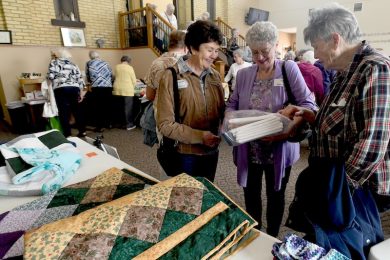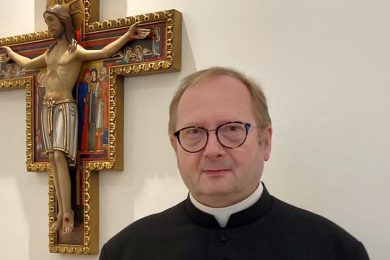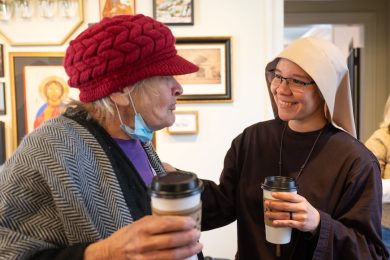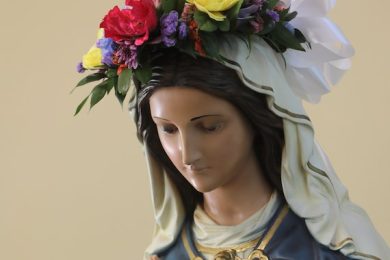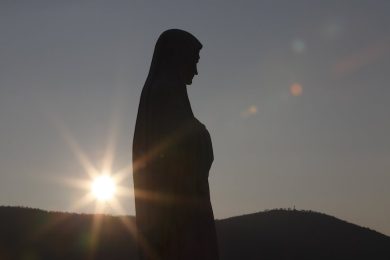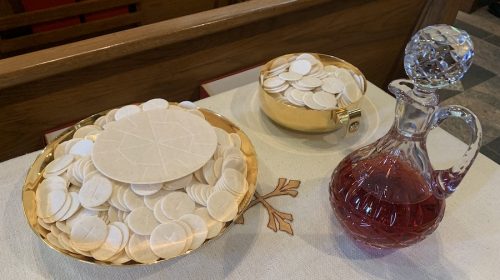The famous Catholic writer Flannery O’Connor recounted in a letter the time she got in an argument with another famous writer, Mary McCarthy, over the Eucharist. McCarthy described the Eucharist as a symbol.
O’Connor’s memorable retort: “Well, if it’s a symbol, to hell with it.” She went on to describe the Eucharist as “the center of existence for me; all the rest of life is expendable.”
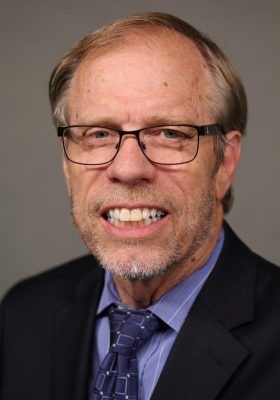
In 2019, the Pew Research Center released a survey that seemed to show that two-thirds of Catholics are more likely to agree with McCarthy, with only 31% likely to share O’Connor’s passionate, deeply Catholic belief that the Eucharist really and truly is the body and blood of Christ.
The Pew findings were an earthquake for many Church leaders. Los Angeles Auxiliary Bishop Robert E. Barron put it succinctly: “This should be a wake-up call to all of us in the Church.” But instead of a wake-up call, the Church got a pandemic instead.
What followed in 2020 was what Cardinal Joseph W. Tobin of Newark, New Jersey, called the “Great Eucharistic Fast,” when churches closed down and Catholics suddenly had to be tutored in what spiritual Communion was while locked out of their churches for months.
Even as bishops worried about not just the quality of Catholics’ belief in the Eucharist, but whether they would even return to its reception once the closures were lifted, the 2020 political campaign introduced a new element of controversy. Joe Biden, very visibly a practicing Catholic and at the same time a supporter of legalized abortion, became the president of the United States.
While some quarters of the Church hailed his openness to Church positions on a host of issues such as immigration, racism and the death penalty, others criticized him for his public position in support of abortion. The chair of the bishops’ pro-life committee, Archbishop Joseph F. Naumann of Kansas City, Kansas, called Biden “the perfect example of the religiously and ethically incoherent straddle,” that is, being personally opposed to abortion while promoting and institutionalizing it.
Last November, the president of the bishops’ conference, Los Angeles Archbishop José H. Gomez, formed a working group of bishops to address concern that, because of the president-elect’s prominence, he could create “confusion with the faithful about what the Church actually teaches.”
In March, Archbishop Gomez said the working group had recommended a letter to Biden expressing the bishops’ willingness to work with him on areas of agreement while expressing concern for those areas, such as abortion, where they disagree. This letter was Archbishop Gomez’s controversial statement on Inauguration Day.
Their second recommendation was “to develop a document addressed to all of the Catholic faithful on eucharistic coherence.” Archbishop Gomez asked the bishops’ doctrine committee to draft a proposal asking the bishops if they want a statement “in the hope that it will strengthen an understanding and deepen a common faith” in the Eucharist.
Since that March announcement, an increasingly divided bishops’ conference has witnessed a growing debate in their own ranks about to what extent this document should address the issue of Catholic politicians who are publicly supporting laws not in accord with Catholic teaching.
So bitter and public has this become that the Vatican has now stepped in, requiring a dialogue among the bishops themselves and then with “Catholic pro-choice politicians” before any “national policy” is suggested.
Beyond the dueling headlines remains the concern that first animated the bishops: Has there been an erosion in Catholic belief about the Real Presence and what does this mean for the Church? Where all sides might agree is that if Catholics do not believe this core teaching of their faith, then denying anyone the right to receive “a symbol” will have very little meaning.
Greg Erlandson, director and editor-in-chief of Catholic News Service, can be reached at gerlandson@catholicnews.com.

